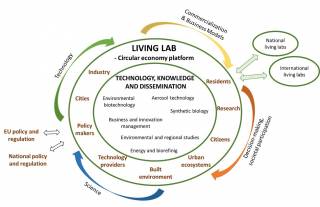The multidisciplinary research of the University Platform for Circular Economy is built upon long-term and continuous collaboration with multiple stakeholders of governance, businesses, industry, citizens and non-governmental organisations. The multi-level approach is a necessity since the transition to sustainable circular economy requires comprehensive understanding of ecological, economic and social processes and the interdependencies between them. The platform collaborates with municipalities and citizens to study, develop and implement sustainable solutions for future cities. The collaboration with industry includes for example development of novel technological solutions and their integration to the current infrastructure and society, and research on new business models. The research results are disseminated to legislators and governmental organizations to support in decision making.
The platform applies, for example, a living lab approach to develop circular economy solutions responding to the global challenges and requirements of sustainable urbanisation. Hiedanranta and ECO3 living labs as open innovation platforms bring together university research, authorities, companies and citizens for mutual resource sharing and knowledge creation. This unique collaboration and proactive networking enables developing and implementing new products, services, processes and systems and make them also scalable to other contexts. This approach, among others, accelerates knowledge transfer between different stakeholders as well as scaling up of the technological solutions.
One example of the platform’s research, which includes strong industrial collaboration is Black Carbon Footprint project. It has large consortium of nine research groups, eight companies, municipalities and the Ministry of Environment, all of them working towards a common goal. The project includes large number of experiments, interviews, modelling work, workshops and other scientific work conducted together with industrial partners, aiming to increase the understanding of the emissions and effects of black carbon and their mitigation, to develop new technologies and to understand the dynamics of businesses as well as national and international policies that are linked with atmospheric black carbon.
The platform members participate for example in the Finland´s strategic programme to promote circular economy. The current partners of the University Platform for Circular Economy are involved in various national and international networks, including International Water Association (IWA), Industrial Biotechnology Cluster Finland (IBC), the International Society for Microbial Electrochemistry and Technology (ISMET), Cost Action: Implementing nature based solutions for creating a resourceful circular city (CA17133), and Cost Action: Protection, Resilience, Rehabilitation of damaged environment (CA19123).

